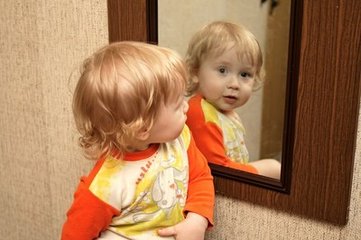You might tend to think of imaginary friends as one of those quirks of childhood,
你可能会把假想朋友当做一种童年怪癖,
something you outgrow and then pretend never happened,
它在你长大之后就没有了,然后假装没发生过,
like wetting the bed or believing in Santa Claus.
就像尿床或相信圣诞老人一样。
It's only when kids don't outgrow them fast enough that parents start to worry.
只有在孩子们成长速度不够快的时候,父母才会开始担心。
But according to psychologists, there isn't much reason to.
但是根据心理学家的说法,没必要担心。
Imaginary friends are totally normal, even in older kids,
有假想朋友完全正常,即使大一点儿的孩子也有,
and contrary to the stereotype, they may indicate good social skills and a healthy creative mind.
与老观念相反,假想朋友预示着良好的社交技能和健康的创造性思维。
Imaginary friends, which researchers call imaginary companions, are vivid make-believe characters that are treated as real.
假想朋友,也被研究人员称为假想伙伴,是被当做真实的、生动的虚假角色。
They're often invisible, but they can also be a personified toy or object.
它们通常是无形的,但也可以是拟人化的玩具或物体。
And usually, they're played with and talked to for at least several months.
通常情况下,他们与假想朋友一起说话玩耍几个月。
Studies suggest they're really common.
研究表明假想朋友很普遍。
Estimates vary, but one study of 1800 children found that 46% of them had one between the ages of 5 and 12.
尽管估计有差异,但一项针对1800名儿童的研究发现,46%年龄在5岁到12岁之间的孩子有假想朋友。
Another well-regarded study found that as many as 65% of children have had an imaginary friend by the time they're seven.
另一项备受关注的研究发现,多达65%的孩子在七岁时就有了假想朋友。
And it's not just preschoolers.
不仅仅学龄前儿童有假想朋友。
Studies have found that elementary and middle schoolers interact with imaginary friends just as much as younger kids.
研究发现,小学生、中学生与假想朋友互动的时间和小孩子一样多。
And even high schoolers sometimes admit to having them.
甚至高中生有时也承认自己有假想朋友。
The stereotypes would have you believe that having an imaginary friend, especially for that long, is a bad sign:
老观念让你相信,有假想朋友,尤其是长时间有假想朋友是一个不好的信号:
that either the kids struggle socially, or that they're mentally ill.
要么是孩子们有社交困难,要么是他们患有精神疾病。
But there's really no evidence for that.
但是没有证据证明这一点。
While it can be kind of jarring to watch a kid talk to someone who isn't there,
虽然看着孩子和不存在的人说话很不和谐,
researchers studying these children report that they usually have a good sense of reality.
但研究这些孩子的人员报告说,这些孩子通常对现实有很好的认知。
Like, they'll often make sure that the researchers know their friend isn't actually real,
比如,他们经常确保研究人员知道他们的朋友不是真实的,
which isn't what people with delusional disorders do.
这不是患有妄想症人能做的。
That misconception might come from the fact children with dissociative identity disorder,
这种误解可能来自于有人格分裂症的儿童,
popularly known as having "multiple personalities",
后者俗称“多重人格”,
also often have imaginary companions, ones that can last into adulthood.
他们也经常有想象中的伙伴,它可以持续到成年。

But it's worth remembering that less than 2% of the population has this disorder,
但值得记住的是,只有不到2%的人患有这种疾病,
at least in North America, which means the vast majority of imaginary friends aren't linked to it.
至少在北美是这样,这意味着绝大多数的假想朋友与之无关。
So while children with certain serious disorders may create imaginary friends,
因此,尽管患有某些严重疾病的儿童可能会创造假想朋友,
that doesn't mean imaginary friends necessarily indicate a serious disorder.
但不意味着有假想朋友必定代表着一种严重疾病。
Another common belief is that kids invent imaginary friends because they don't have enough real ones.
另一种普遍看法是,孩子们虚构假想朋友是因为没有足够的真实朋友。
But that's not true, either.
但这也不是真的。
For example, a study done for a 1991 doctoral dissertation found
例如,一项1991年的博士论文发现,
that kids with imaginary friends were less shy and had more non-imagined friends than their peers.
那些有假想朋友的孩子比同龄人更外向,真实朋友也更多。
And that's a trend that's been seen in numerous other studies.
这一趋势在其他很多研究中都有体现。
That may be because having an imaginary friend helps kids cope with stress and conflict,
这可能是因为假想朋友可以帮助孩子应对压力和冲突,
ultimately improving their social skills.
最终提高他们的社交技能。
Other research seems to indicate that imaginary friends aid social development by improving a child's theory of mind.
其他研究似乎表明,假想朋友通过改善孩子的心智理论来帮助社会发展。
Theory of mind, which people normally develop between ages three and four,
人们通常在三到四岁时发育的心智理论,
is your ability to understand that others have different thoughts and feelings than you do.
是理解别人不同想法和感受的能力。
For example, A 1997 study of 152 children found that
例如,1997年一项对152名儿童的研究发现,
4-year-olds with imaginary companions were better at theory of mind tasks than those who didn't have them.
有假想朋友的4岁儿童比没有的同龄人更擅长心智理论任务。
So these kids were better able to understand what was happening in someone else's head,
所以这些孩子能够更好地理解别人的想法,
even though they spent so much time in their own.
尽管他们花了很多时间在自己的想法上。
And being better at theory of mind at age four predicted better emotional understanding at age seven.
四岁时在心智理论方面做得更好的孩子,在七岁时就能更好地理解情感。
These kids were better at understanding their own and others' emotions,
这些孩子更善于理解自己和他人的情感,
including how someone's personality might shape their feelings or how they respond to different situations.
包括人的性格如何影响感觉,或者他们如何应对不同的情况。
And that's important, because studies have found that
这很重要,因为研究发现
emotional understanding is a key part of developing good social skills as well as a child's overall psychological wellbeing.
情感理解是培养良好社会技能和孩子整体心理健康的关键。
There also seem to be linguistic benefits to having an imaginary friend.
拥有一个假想朋友似乎也有语言上的好处。
Studies have shown that children with imaginary friends create richer narratives
研究表明,有假想朋友的孩子会创造出更丰富的故事,
when asked to tell a story and use more complex sentence structures when they speak.
他们在被要求讲故事时,会使用更复杂的句子结构。
They also have a larger receptive vocabulary,
他们的接受性词汇量也更大,
which is the number of words that they can recognize and understand.
接受性词汇量是识别和理解的单词数量。
If at this point, you're thinking back to your childhood
如果此时你回想起自己的童年,
and worrying what it means that you didn't have an imaginary friend, you can relax.
担心你没有假想朋友,可以放松了。
You may have just forgotten yours.
你可能刚好忘记了你的假想朋友。
Many kids simply forget about their companions when they get older.
许多孩子长大后就会忘记他们的假想朋友。
It's also possible you didn't have one and that's totally OK.
也有可能你没有假想朋友,但没关系。
Scientists aren't entirely sure why some kids do and other kids don't,
科学家们并不完全确定为什么有些孩子有假想朋友,而其他孩子没有。
although we do know that firstborns and kids who are an only child are more likely to have them.
虽然我们知道长子长女和独生子女更有可能拥有假想朋友。
Which might be another reason they've been linked to loneliness.
这可能是他们与孤独有关的另一个原因。
Rather than loneliness, though,
不过假想朋友与孤独无关,
it might have more to do with the amount of unstructured free time kids have for imaginative play,
它可能与孩子们用于想象游戏的松散自由时间数量更相关。
because kids who watch less TV are also more likely to have an imaginary friend.
因为少看电视的孩子更有可能有假想朋友。
So, it's not a bad thing if you didn't have one.
所以,如果你没有也不是件坏事。
It's just also not a bad thing if you did.
如果你有也不是坏事。
And if you see a kid start pouring tea for a giant invisible pink elephant made of cotton candy,
如果你看到一个孩子开始倒茶给一个看不见的棉花糖做的粉红色大象,
there's really no reason to freak out.
真的不必害怕。
Thanks for watching this episode of SciShow Psych!
感谢您收看本期的心理科学秀!
If you have kids or happen to know any that you want to share your love of science with,
如果你有孩子,或者碰巧知道某人,想与之分享你对科学的热爱,
you can check out our SciShow Kids channel at youtube.com/scishowkids.
可以登录儿童科学频道的youtube.com/scishowkids。
There are all sorts of great videos there,
这里有各种优秀的视频,
and you might find that both you and the little ones learn something new.
你可能会发现自己和孩子们都学到了一些新知识。


